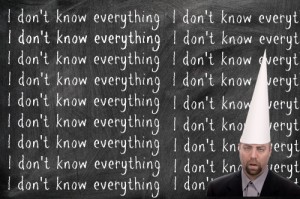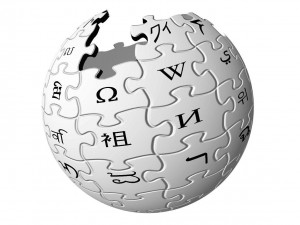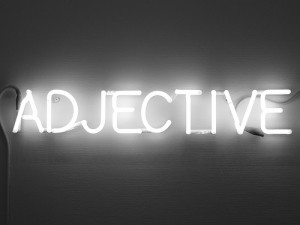 Nah, there’s really only one, but if you’re a writer, it’s a big one (and a reason that wakes many in a cold sweat): you don’t want to look as if you don’t know your own profession. Quick pop quiz:
Nah, there’s really only one, but if you’re a writer, it’s a big one (and a reason that wakes many in a cold sweat): you don’t want to look as if you don’t know your own profession. Quick pop quiz:
Which of the sentences below is correct?
There are a myriad of reasons to be wondering what the heck this blog is regarding.
There are myriad reasons to be wondering what the heck this blog is regarding.
I’ll give you a hint: “myriad” is an adjective.
And a noun.
They’re both correct.
Don’t you love the English language (rhetorical question you Spanish, French, German, etc. speaking readers)? 🙂
When I was a fledgling writer, oh so many years ago, a mentor (and not only excellent writer but mind in general) complimented me on being one of the few writers he knew who used the word correctly (I used it as an adjective, e.g. “I saw myriad paths to be taken.”). My head blew up like a hot air balloon. And that wasn’t the only time I was patted on the back (or cringed when I read an official news release by a President or an article by a highly-paid writing professional like “They found a myriad of protesters gathered at the White House lawn.”).
 Just the other day I told a writer friend who trusts me that the correct usage was in the form of an adjective (e.g. “innumerable”) and you shouldn’t say “a myriad of stars in the sky.” Then my own self-criticism got the better of me and I really started researching (I’d never actually told anyone how to use it, I just always chuckled to myself that I knew where the bear dumped his load in the buckwheat).
Just the other day I told a writer friend who trusts me that the correct usage was in the form of an adjective (e.g. “innumerable”) and you shouldn’t say “a myriad of stars in the sky.” Then my own self-criticism got the better of me and I really started researching (I’d never actually told anyone how to use it, I just always chuckled to myself that I knew where the bear dumped his load in the buckwheat).
Wikipedia put me in my place first. The word’s origin is from the Greek “(myrios, plural myriades), ‘numberless, countless, infinite’, [and] is a classical Greek word for the number 10,000.” The irony is that the noun form of the word predates its use as an adjective. Wikipedia uses two literature examples (from Webster.com):
“The noun myriad has appeared in the works of such writers as Milton (plural myriads) and Thoreau (a myriad of), and it continues to occur frequently in reputable English.”
This excellent 2009 blog on the subject by a fellow grammarian (and originally, too, a believer in the adjectival form of the word) Brian White had the following to share:
“Garner’s Modern English Usage says that while ‘myriad is more concise as an adjective … the mere fact that the adjective is handier than the noun doesn’t mean the latter is substandard. The noun (ca. 1555) has been with us more than 200 years longer than the adjective (ca. 1791), and the choice is a question of style, not correctness.’”
 So I am putting this one to bed, jettisoning my braggadocio on the subject, and apologizing to my friend, whom I steered incorrectly. However, I will continue to use the word in its (to me) efficient form.
So I am putting this one to bed, jettisoning my braggadocio on the subject, and apologizing to my friend, whom I steered incorrectly. However, I will continue to use the word in its (to me) efficient form.
(And secretly believe, self-gratuitously of course, that I am still right.)
I know.
I’m incorrigible.
~~~~~~~~~~~~~~~~~~~~~~~~~~~~~~~~~~
The blank page is dead…long live the blank page.
~~~~~~~~~~~~~~~~~~~~~~~~~~~~~~~~~~
 Author known to use spontaneous satire, sarcasm, and unannounced injections of pith or witticisms which may not be suitable for humorless or otherwise jest-challenged individuals. (Witticisms not guaranteed to be witty, funny, comical, hilarious, clever, scintillating, whimsical, wise, endearing, keen, savvy, sagacious, penetrating, fanciful, or otherwise enjoyable. The Surgeon General has determined through laboratory testing that sarcasm can be dangerous, even in small amounts, and should not be ingested by those who are serious, somber, pensive, weighty, funereal, unsmiling, poker-faced, sober, or pregnant.)
Author known to use spontaneous satire, sarcasm, and unannounced injections of pith or witticisms which may not be suitable for humorless or otherwise jest-challenged individuals. (Witticisms not guaranteed to be witty, funny, comical, hilarious, clever, scintillating, whimsical, wise, endearing, keen, savvy, sagacious, penetrating, fanciful, or otherwise enjoyable. The Surgeon General has determined through laboratory testing that sarcasm can be dangerous, even in small amounts, and should not be ingested by those who are serious, somber, pensive, weighty, funereal, unsmiling, poker-faced, sober, or pregnant.)



I am so glad you wrote this post. I thought it was a fabulous post for several reasons – not only for the education you provided, but showing your passion for words. There’s a definite feel of excitement when learning the origin of a word, its history, and the correct way to use it. If I have to choose between style and correctness though, I choose being correct – for myriad reasons 🙂
I’m with you, Rob. I tend to use it as an adjective, although I understand its nounal form is also acceptable.